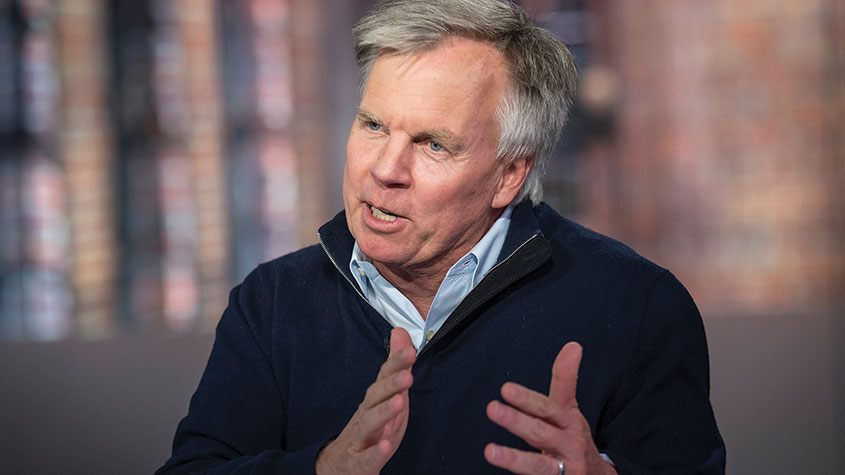How a love of technology made Debra Charles a million
Debra Charles turned her love of gadgets and her business experience into a multi-million pound venture in Novacroft.

Get the latest financial news, insights and expert analysis from our award-winning MoneyWeek team, to help you understand what really matters when it comes to your finances.
You are now subscribed
Your newsletter sign-up was successful
Want to add more newsletters?

Twice daily
MoneyWeek
Get the latest financial news, insights and expert analysis from our award-winning MoneyWeek team, to help you understand what really matters when it comes to your finances.

Four times a week
Look After My Bills
Sign up to our free money-saving newsletter, filled with the latest news and expert advice to help you find the best tips and deals for managing your bills. Start saving today!

Debra Charles (now 52) has always been "fascinated with technology and how it can make life better". From an early age she grew interested in the gadgets her parents liked to buy, and her first jobs were with the likes of Apple and Westinghouse. At Westinghouse sherose to a senior position, overseeingco-ordination of the firm's business activities in Europe.
However, while working there, she began to question whether she really wanted to work for a large organisation. The death of her parents in 1998 got her thinking about life's big questions and proved to be a tipping point.
Debra decided to go it alone and set up Novacroft a company dedicated to developing systems and technology that could help the public sector cut down on waste and increase transparency.A £90,000 inheritance from her parents got her started, but getting public-sector bodies, used to dealing with large conglomerates, to take her seriously was difficult to begin with. At the same time, the technology boom of the time meant that she struggled to convince skilled programmers to take a chance on her start-up. Despite these hurdles, she "never seriously considered going back to corporate life".
MoneyWeek
Subscribe to MoneyWeek today and get your first six magazine issues absolutely FREE

Sign up to Money Morning
Don't miss the latest investment and personal finances news, market analysis, plus money-saving tips with our free twice-daily newsletter
Don't miss the latest investment and personal finances news, market analysis, plus money-saving tips with our free twice-daily newsletter
Instead, she simply worked harder.Her passion to "make things happen" sometimes had her working 48 hours straight without sleeping. This dedication paid off as her firm began to make rapid progress, securing a £300,000 contract with the Energy Saving Trust within eight months. This contract was large enough to enable Charles to expand her team and move to bigger premises, a change that she remembers with pride. It was something like skiing, she says: difficult and painful to get started, but hugely enjoyable once you've got the knack.
Her big breakthrough, however, came in 2002 when Novacroft won a contract with Transport for London (TfL).At the time, TfL had been facing severe criticism for the fact that it took it up to 48 days to process requests for its Oyster photocard scheme for concessionary users. Novacroft supervised a move from hardcopy to electronic applications, cutting out a large amount of waste. This allowed people to apply online and reduced processing times to as little as one working day.
Since then Novacroft has continued to prosper, concentrating mainly on the transport sector. It is also working with charities to use technologies to cut administration costs, which currently consume a large proportion of most charities' budgets. From a team of only six in its early days, Novacroft currently has around 200 employees and a turnover of around £7m. The main challenge for the company is to make sure its technology remains cutting-edge, which demands investment.
Charles has advice for those who wish to follow in her footsteps. First, keep it simple. "Simplification is the height of sophistication," she says. Secondly, you should "take a long, hard look at your idea" and "listen to what people are saying about it". It it also vital to "make sure that things work from a financial standpoint" ie, you may have a good idea, but will it make money? To answer these questions honestly, make every effort to "leave your ego at the door".
Get the latest financial news, insights and expert analysis from our award-winning MoneyWeek team, to help you understand what really matters when it comes to your finances.

-
 Inheritance tax investigations net HMRC an extra £246m from bereaved families
Inheritance tax investigations net HMRC an extra £246m from bereaved familiesHMRC embarked on almost 4,000 probes into unpaid inheritance tax in the year to last April, new figures show, in an increasingly tough crackdown on families it thinks have tried to evade their full bill
-
 Average UK house price reaches £300,000 for first time, Halifax says
Average UK house price reaches £300,000 for first time, Halifax saysWhile the average house price has topped £300k, regional disparities still remain, Halifax finds.
-
 Ron Johnson: the retail king’s quest for redemption
Ron Johnson: the retail king’s quest for redemptionProfiles Ron Johnson’s spell at JCPenney, following his triumph at Apple, was a disaster. Now, his latest attempt to rescue his reputation has just crashed into bankruptcy.
-
 Tim Cook: the man who filled Steve Jobs’ shoes at Apple
Tim Cook: the man who filled Steve Jobs’ shoes at AppleProfiles No one expected much from Tim Cook when he took over the top job on the Apple founder’s death. But he has quietly led the firm to extraordinary new heights.
-
 Three women CEOs who prove that diversity is the key to success
Three women CEOs who prove that diversity is the key to successProfiles Tom Saunders looks at how three very different women – Shahrzad Rafati, Trinny Woodall and Anne Boden – have grown successful businesses.
-
Tom Dudderidge: Riding the iPod bandwagon to £25m
Features Salesman Tom Dudderidge started his own business selling Taiwanese i-Pod docks for cars. Four year slater his form was designing its own products, and bringing in sales of £25 a year.